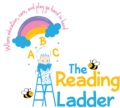The Reading Ladder
Pre-K
Unique and age-appropriate learning experiences are the framework of TRL pre-kindergarten program, including exposure to:
- Science
- Math
- Arts
- Language
- And much more
Some of the skills that children are developing in our preschooler’s program include:
- Participating in teacher-led group activities
- Managing transitions
- Following rules and routines
- Counting
- Sorting
- Expressing themselves through art and movement
- Identifying some printed letters and words
- Developing literacy skills in preparation for
Kindergarten is one of the primary goals of our Pre-K program. To meet this goal, we infuse print and literacy experiences into each learning center throughout our classrooms. We also have a dedicated literacy center in each Pre-K room, which provides children with the opportunity to play games with letters and their sounds and use sensory materials such as play dough or sand to write letters. The children in our Pre-K program always have access to paper and different writing utensils to work on developing a pencil grasp and to advance fine motor coordination.
We believe children learn best through play-based experiences, so to teach them these important skills, we incorporate activities such as silly stories with reoccurring letter sounds and we play games that include letter identification. When children are having fun, are interested in the activity, and are using multiple senses, they learn and retain more information. For this reason, we do not use dittos or worksheets in our Pre-K program as they have been found to be less engaging and fun for children.
The program is designed to promote emergent reading and writing comprehension. We offer a variety of fun and stimulating activities to help children identify letters, comprehend sounds and words, and develop best practices to support early writing habits. Each lesson takes place in a teacher-led, small group setting with the intention of enhancing the emergent literacy skills that children are already learning as part of our EPiC preschool curriculum.
The curriculum for our older preschoolers is based on two-week-long studies with topics including the changing seasons, community helpers, animal habitats and adaptations, transportation, and wacky science experiments. We always start a new study by asking the children what they already know about the new topic and what they want to learn. Our teachers adapt the curriculum through the use of different learning experiences to meet the developmental needs and interests of each student.
Bringing Hands on Learning into the Classrooms
All our activities are play-based and hands on to provide exceptional learning experiences for the children. For instance, each autumn as we learn about the changes in the seasons and the community in which we live, our older preschoolers take field trips to pick apples and pumpkins at local farms.
The classrooms for the older Preschoolers are divided into many different learning centers.
These include:
- Dramatic play (where children can dress up and take on family and community helper roles)
- Block and building
- Sensory tables (which we change based on our current study)
- Manipulatives and math
- Science
- Art and creative expression
- A cozy corner (a soft and calming area where children can go to relax and have time alone if they choose)
- Literacy
- Music and movement
The learning areas may change their appearance throughout the month based on our themes. For instance, our dramatic play center might turn into an airport as we learn about transportation or into a farm as we talk about life cycles. Students often add their own props to these areas for use during play.
We foster the students’ independence by encouraging them to choose which centers they would like to explore during our center time. You will find that our teachers move throughout each area while children are playing to promote social skills, language development, and higher order thinking. During this time, our teachers are also making observations of their students’ development and they are planning future challenges which will further their skills. Three times a year, families are offered an opportunity to have a personal meeting with their child’s teacher to discuss their current development and to define goals to assist them with refining their skills to prepare them for Kindergarten.
